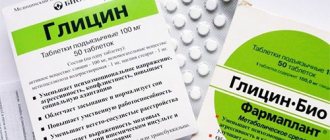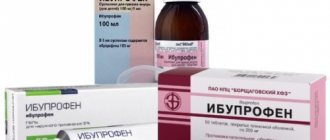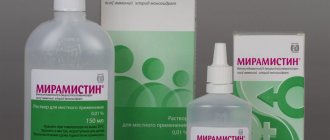An increase in temperature in a nursing woman is one of the most common complaints in the postpartum period. The appearance of fever becomes a cause for concern about the health of not only the mother, but also the child, who vitally needs breast milk. In addition, there are many prejudices against breastfeeding when the mother has a fever. It is important not only to determine why the febrile condition occurred, but also to choose the optimal treatment tactics that will not harm either the patient or the child.
Causes of fever during breastfeeding associated with the mammary glands include:
- accumulation of excess milk, or lactostasis;
- lactation mastitis;
- thermometry error.
Temperature in a nursing mother is also often due to the following reasons:
- acute respiratory infections (ARI);
- acute intestinal infections (AI);
- postpartum complications;
- exacerbation of chronic diseases.
We can talk about the error of thermometry when body temperature is measured in the armpit (axillary) cavity and remains within the subfebrile range. At the same time, there are no symptoms of local changes (enlargement, tenderness of the mammary gland, the appearance of pathological discharge from the nipple) or signs of a cold (cough, runny nose). A systemic temperature of 37 °C in a nursing mother is absolutely normal, since the axillary temperature during filling of the mammary glands can be much higher than low-grade fever, and decreases during feeding and a decrease in the amount of milk.
To avoid misidentification of fever, it is recommended to perform rectal or oral thermometry (in the rectum, in the mouth) or measure the temperature in the elbow.
An increase in temperature during breastfeeding is not always due to lactation and can be explained by infection with bacteria or viruses that provoke ARI, acute intestinal infections and any other acute variants of infectious diseases. If a nursing mother has a temperature of 40 °C, this indicates a severe course of the disease and suggests the presence of a purulent focus. Any chronic pathologies can worsen both during pregnancy and after the birth of a child - and they are not always associated with bacteria or viruses (for example, diseases of the nervous, endocrine system, gastrointestinal tract, etc.). Causes of fever in a nursing mother also include endometritis, infection of the surgical wound after cesarean section and other postpartum purulent-septic diseases.
Temperature during breastfeeding

05/22/2015 Breastfeeding Each of us knows what exactly needs to be done at the first sign of a cold. But when chills appear and the temperature rises during breastfeeding, this inevitably raises fears of harming the baby. Young mothers are at a loss as to how to help their body as soon as possible and are looking for the cause of the elevated temperature.
Elevated thermometer readings may indicate that a nursing mother has a cold, but there are other reasons, which a qualified specialist will help you determine. Temperature fluctuations can occur in the first weeks after birth, but let your doctor decide how dangerous they are.
If a nursing mother has not visited public institutions with large crowds of people in the near future, then postpartum inflammatory diseases or exacerbation of chronic diseases should not be ruled out.
Self-medication in such cases is dangerous, as it can worsen the problem.
One of the reasons may be lactation mastitis, when inflammation in the mammary glands is observed against the background of general weakness of the body with an increase in temperature. This disease cannot be treated without taking antibiotics.
Anemia
Another cause of fatigue during lactation is anemia. The loss of blood that occurs during childbirth can cause anemia. It is recommended to saturate your diet with foods that contain iron: beans, chickpeas, lentils, lean red meat, seafood and others. It is also necessary to consult a doctor to prescribe a vitamin complex.
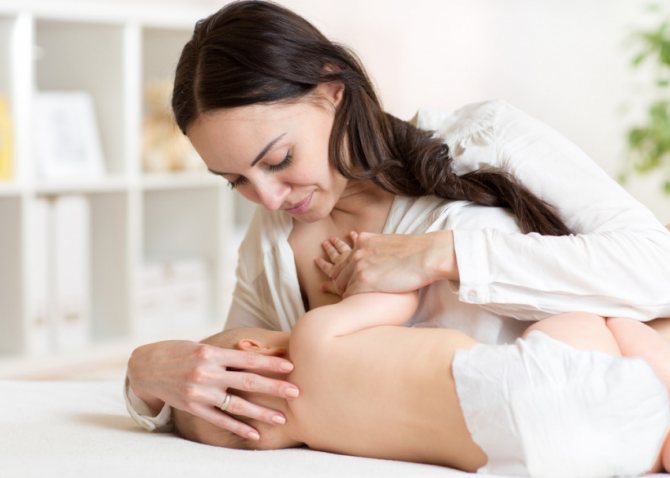
Is breastfeeding allowed at high temperatures?
Temperature during breastfeeding may indicate a serious illness, so only a doctor can make a diagnosis and determine how much treatment will affect the process of milk production.
Breastfeeding can continue if:
- The temperature during breastfeeding increased during the menstrual cycle,
- Fever is one of the symptoms of a cold, mastitis, sore throat, even pneumonia, which can be treated with gentle medications or special antibiotics that do not affect the feeding process. If you stop breastfeeding at such a moment, the baby will be deprived of protection from various types of viruses and bacteria.
- Fever is caused by fatigue or sleep disturbances.
- The temperature is caused by stagnation of milk in the milk ducts.
However, there are some diseases in which breastfeeding can be dangerous, and the baby is temporarily transferred to artificial nutrition.
What diseases are these?
- Purulent mastitis - with this diagnosis, harmful bacteria can penetrate into breast milk.
- Heart failure.
- Kidney failure.
- A disease for which antibiotics that are incompatible with hepatitis B are prescribed.
- Exacerbation of chronic diseases of the liver, lungs, kidneys.
Usually, breastfeeding is stopped for the duration of treatment, by expressing the breast and maintaining lactation for the subsequent resumption of feedings. But if a serious diagnosis is made, it may be necessary to stop breastfeeding.
How to raise your temperature while breastfeeding?
It is advisable not to prescribe anything to yourself. To raise your temperature, you need to get a good night's sleep and rest. After all, the cause of low temperature is overwork. In addition, it is worth taking a hemoglobin test. If the temperature is caused by a low hemoglobin concentration, take iron supplements, for example Maltofer. It is safe and can be taken while breastfeeding. A diet to increase hemoglobin is welcome. Eat buckwheat porridge, boiled beet liver and baked apples.
Low lactation temperature
How to deal with fever during hepatitis B?
Since many of the drugs can pass into breast milk, many mothers prefer to lower the temperature and be treated with traditional methods, without resorting to medications.
It must be remembered that the temperature up to 38.5 degrees is not brought down with medication, since at such a time the body fights the disease on its own and the increased temperature promotes the production of antibodies.
Rest, bed rest, and ventilation of the home will help speed up the healing process. If the temperature has exceeded 38.5, then a common remedy for lowering it is paracetamol.
Paracetamol does not have any effect on breast milk, unlike aspirin and ibuprofen, which can cause allergic reactions in the baby.
Wiping with a damp cloth dipped in cool water will help reduce the temperature. Hot teas with chamomile, raspberries, lemon and honey will also help. It should be remembered that drinking plenty of fluids promotes increased milk production, so fluid intake should be controlled.
The described methods for reducing fever are suitable provided that it lasts no more than three days. For a longer period, the help of a doctor is necessary, who will determine the diagnosis and prescribe appropriate treatment.
The Best Foods to Fight Fatigue During Breastfeeding
- Banana is a rich source of potassium, magnesium and vitamin C. Natural sugars present in banana such as fructose, sucrose and glucose act as a quick energy booster.
- Green tea contains a high percentage of polyphenols, which helps reduce stress, improve your mental focus, and increase energy.
- Oatmeal helps fight fatigue as it contains high-quality carbohydrates in the form of glycogen. The ingredient supplies fuel to your brain and muscles throughout the day.
- The high percentage of carbohydrates, protein and probiotics present in yogurt also help fight symptoms of fatigue.
Any of the above symptoms is a reason to consult a doctor!
Photo: shutterstock
Why does a nursing mother's temperature rise and how to reduce it?
Breastfeeding is a natural process, equally necessary for both mother and baby. A nursing woman tries to stick to a diet, drink plenty of fluids, and do breast massage so that feeding is complete and correct. What to do when your temperature rises while breastfeeding. Is this considered a contraindication and what should I do if I have a severe fever?
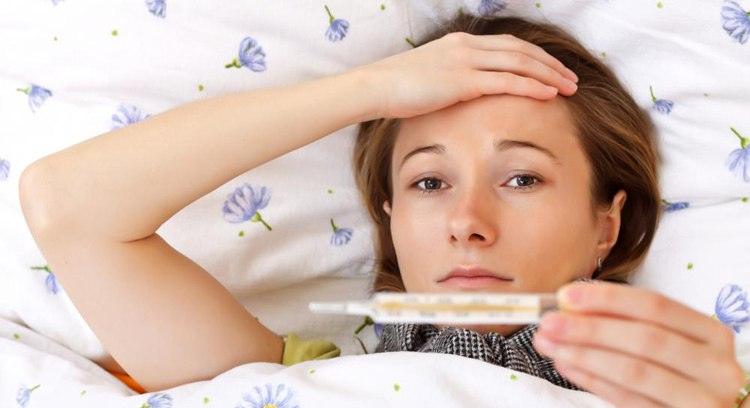
Intoxication
During breastfeeding, intestinal infections and poisoning with various substances cannot be ruled out. Poisoning often occurs when consuming stale food products, as well as those whose storage conditions have been violated.
If nausea during lactation is caused by intestinal infections, then you need to stop breastfeeding for a while and undergo a course of treatment. If the cause of intoxication is poisoning with any toxic substances, it is necessary to consult a doctor about the advisability of stopping breastfeeding for the period of treatment.
Sometimes symptoms of intoxication appear when a woman is prone to allergies. Any allergens can trigger an attack of nausea.
The main reasons for the increase in temperature during hot water
Fever in a nursing mother is a common problem in the postpartum period. Fever, aching joints, and chills cause a lot of anxiety and worry. After all, the well-being of the child, for whom it is vitally important to receive breast milk, directly depends on the woman’s health. Here it is necessary to accurately determine the cause of the fever and eliminate it as soon as possible. Serious treatment may be required, the tactics of which can be determined by an experienced doctor.
The temperature often rises due to:
- acute viral diseases;
- food poisoning;
- complications after childbirth;
- exacerbation of chronic ailments.
If we associate the temperature that rises sharply during breastfeeding with breast problems, we can note:
- lactostasis;
- mastitis at any stage;
- errors in temperature measurement (thermometry).
During thermometry, no pain or pathological discharge from the mammary glands was observed. There are also no signs of runny nose or cough. The temperature rises to 37 C and is constantly within this limit. This condition is considered normal, since when the ducts are full, the temperature always increases. When the chest is emptied, the temperature returns to normal.
To prevent nursing mothers from attributing feverish fever to themselves by measuring the temperature under the armpit, they are recommended to take measurements rectally, orally or in the elbow.
Is it possible to continue feeding with a fever?
During this difficult period, much depends on the cause of the temperature. Breastfeeding is contraindicated if:
- pathologies of the kidneys and genitourinary system;
- purulent mastitis;
- blood diseases;
- tuberculosis;
- acute infectious diseases.
In case of severe illnesses, toxic substances along with milk easily penetrate the infant’s fragile body and cause harm to its health. Doctors advise temporarily expressing and throwing away milk when:
- Pneumonia, purulent tonsillitis, sinusitis (if the mother takes antibiotics). At the same time, regardless of the absence or presence of temperature, it is better to wear a gauze bandage when in contact with the baby.
- Dysentery, severe intestinal poisoning. If the disease is mild, the baby is given expressed, boiled breast milk.
Feeding is stopped completely if prescribed:
- analgesics based on narcotic substances;
- chemotherapy;
- immunosuppressive drugs.
Useful : we also have a separate article that reveals in detail the topic - natural feeding with a mother’s temperature
Chills while breastfeeding
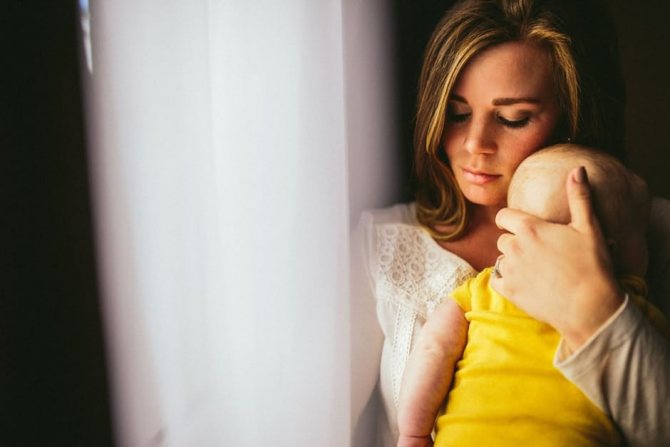
I've been breastfeeding for almost a year now. Our breastfeeding did not start out easily, but my son and I, thanks to the enormous support of my husband, were able to get everything right.
Having returned home from the maternity hospital after a long journey (we gave birth in Seversk and drove about 4 hours home), my son and I went to bed. And then I started getting chills. I was shaking so hard that I couldn’t touch my teeth. I asked my husband to cover me with something warm, but it was not enough. As a result, my husband brought more blankets, wrapped me completely in a large cocoon, and I still managed to fall asleep. This strange phenomenon continued every night for about a week or two, now I can’t remember exactly. And then it passed. At that time I didn’t understand what was happening to me, I lived in some kind of autonomous mode, and since I was treating cracks, I associated my “frosty nights” with them. I didn’t think much about the fact that I had chills every night because I had to endure terrible pain while feeding. The son fed on demand and for the first month hung on his chest almost constantly. I did not have lactostasis or mastitis.
After some time, I completely forgot about this strange phenomenon that accompanied me at the beginning of my “nursing” career. But it so happened that I encountered him again during my training as a lactation consultant. Since many girls also experience chills at night after breastfeeding (judging by the forums), I decided to clarify the situation somewhat, in case someone finds this information useful.
So, it turned out that some mothers, in the evening or at night, during high tide, feel very cold. But it also happens that these “attacks” of chills do not depend at all on the time of day. For me this always happened at night, during the day everything was fine.
However, for all mothers this happens only in the first weeks of feeding, and then everything returns to normal. And it turns out that this phenomenon is directly related to the hormone prolactin.
Prolactin is the main hormone of breastfeeding . The production of this amazing hormone increases during pregnancy, as well as during the postpartum period when you are breastfeeding. It can also be noted that prolactin is produced during intense physical activity, during sleep, and even when we experience stress. We are, of course, interested in the effect of this hormone on breastfeeding.
When your baby nurses, the pituitary gland stimulates the production of the hormone prolactin in response to breast stimulation. There are prolactin receptors in the mammary glands, heart, lungs and liver. And the most important thing for us is that these receptors are also present in the kidneys and adrenal glands, which, in response to an increase in prolactin levels, begin to produce the hormones adrenaline and norepinephrine. And this, in turn, can cause an increase in blood pressure. Blood pressure rises very sharply in response to the production of prolactin, and we feel terrible cold and chills.
So this body trembling is a consequence of a sharp increase in blood pressure, provided that your body temperature is normal. Most often this happens at night, at a time when prolactin production is increased in response to breast stimulation. Some women experience chills in the first days after childbirth, with the arrival of milk and the beginning of breastfeeding. In fact, all doctors note that the effect of the hormone prolactin is currently not fully understood. We know too little about this amazing lactation hormone.
Chills during breastfeeding
It was like that in the maternity hospital, chills and my whole shirt was wet through. This is due to the flow of milk and hormones.
This also happens at night, and in the evening I feel hot and sweat terribly
I had the same thing, then my temperature started to rise. I started pumping and it all went away.
I'll take note
It was like this... in gvtt higher, maybe that’s why there is a feeling of cold in the morning
Yes, in the maternity hospital every night I woke up all wet and shaking violently from the cold
And now? It started for me when I was already at home
It's been a couple of days now
It happened, then after 2-3 days I found lumps in my breast, I pumped and it went away
Wow, I haven’t found it yet
it happens... but there is no temperature and the room is warm
Yes, every night. I just put on a warm robe and socks when I got up to feed) as soon as I stopped feeding, the chills went away
How long did you feed?
It was so! For a whole month after giving birth, I was shaking at night... I slept in a winter robe, under two blankets, with a heating pad. Then it passed
So I'm thinking of warming myself up
This happened a couple of times... I don’t know why
Same garbage, no fever, but terrible chills.
Yes, only at night, I get up all wet clothes.
These are hormones, you can’t do anything about them, for the first month I woke up all wet and at the same time I was shaking wildly from the cold, when lactation became established it became easier.
Low blood sugar
While breastfeeding, your blood sugar levels may periodically drop. This is considered an absolutely normal phenomenon and does not require specific treatment. If you have a glucometer at home, you can check your sugar level just for fun. If it decreases, it is recommended to eat caramel.
Low blood sugar is accompanied by the following specific symptoms:
- severe headache;
- nausea;
- dizziness;
- feeling hungry.
Blood sugar can also decrease due to various endocrine disorders. If this phenomenon occurs constantly, then you need to consult a doctor.
Chills while breastfeeding
I've been breastfeeding for almost a year now. Our breastfeeding did not start out easily, but my son and I, thanks to the enormous support of my husband, were able to get everything right.
Having returned home from the maternity hospital after a long journey (we gave birth in Seversk and drove about 4 hours home), my son and I went to bed. And then I started getting chills. I was shaking so hard that I couldn’t touch my teeth. I asked my husband to cover me with something warm, but it was not enough. As a result, my husband brought more blankets, wrapped me completely in a large cocoon, and I still managed to fall asleep. This strange phenomenon continued every night for about a week or two, now I can’t remember exactly. And then it passed. At that time I didn’t understand what was happening to me, I lived in some kind of autonomous mode, and since I was treating cracks, I associated my “frosty nights” with them. I didn’t think much about the fact that I had chills every night because I had to endure terrible pain while feeding. The son fed on demand and for the first month hung on his chest almost constantly. I did not have lactostasis or mastitis.
After some time, I completely forgot about this strange phenomenon that accompanied me at the beginning of my “nursing” career. But it so happened that I encountered him again during my training as a lactation consultant. Since many girls also experience chills at night after breastfeeding (judging by the forums), I decided to clarify the situation somewhat, in case someone finds this information useful.
So, it turned out that some mothers, in the evening or at night, during high tide, feel very cold. But it also happens that these “attacks” of chills do not depend at all on the time of day. For me this always happened at night, during the day everything was fine.
However, for all mothers this happens only in the first weeks of feeding, and then everything returns to normal. And it turns out that this phenomenon is directly related to the hormone prolactin.
Prolactin is the main hormone of breastfeeding . The production of this amazing hormone increases during pregnancy, as well as during the postpartum period when you are breastfeeding. It can also be noted that prolactin is produced during intense physical activity, during sleep, and even when we experience stress. We are, of course, interested in the effect of this hormone on breastfeeding.
When your baby nurses, the pituitary gland stimulates the production of the hormone prolactin in response to breast stimulation. There are prolactin receptors in the mammary glands, heart, lungs and liver. And the most important thing for us is that these receptors are also present in the kidneys and adrenal glands, which, in response to an increase in prolactin levels, begin to produce the hormones adrenaline and norepinephrine. And this, in turn, can cause an increase in blood pressure. Blood pressure rises very sharply in response to the production of prolactin, and we feel terrible cold and chills.
So this body trembling is a consequence of a sharp increase in blood pressure, provided that your body temperature is normal. Most often this happens at night, at a time when prolactin production is increased in response to breast stimulation. Some women experience chills in the first days after childbirth, with the arrival of milk and the beginning of breastfeeding. In fact, all doctors note that the effect of the hormone prolactin is currently not fully understood. We know too little about this amazing lactation hormone.
Fatigue
Nausea during breastfeeding can also be due to extreme fatigue. In the first months of a child’s life, a woman experiences enormous stress. At this time, the child’s daily routine has not yet fully developed, so the baby’s nighttime sleep can be greatly disturbed. In addition, the baby asks to eat every 3-4 hours, and during this period of time he still has to change his diaper and change his clothes.
Fatigue does not have the best effect on the mother of a baby. She literally collapses from fatigue. This condition is accompanied by dizziness, weakness and periodic nausea. To get rid of these unpleasant symptoms, a woman needs to adjust her daily routine. If your baby doesn't sleep well at night, you need to go to bed with him during the day.
At first, it is advisable to involve grandmothers in caring for the child. Due to this, the mother will be able to recover faster after childbirth.

